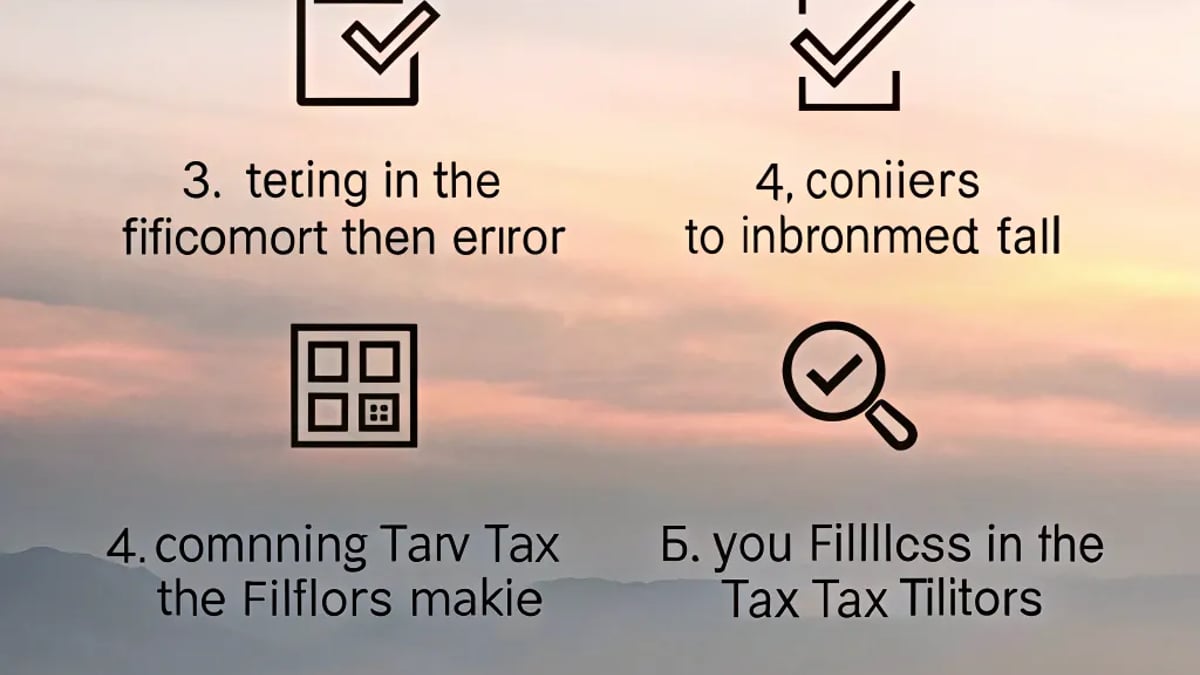
Tax season often brings a mixture of anxiety and confusion for many people. Whether you're filing taxes for the first time or have been doing it for years, the complex nature of tax laws makes it easy to slip up. These mistakes can cost you money, delay your refund, or worse, trigger an audit. Let's explore the most common tax filing mistakes and practical ways to avoid them.
Understanding the Basics: Where Most People Go Wrong
The foundation of accurate tax filing begins with understanding the basics, yet this is precisely where many taxpayers stumble. According to the IRS, millions of returns contain errors that could have been easily prevented.
Incorrect or Missing Social Security Numbers
It might sound obvious, but incorrect Social Security Numbers (SSNs) remain one of the most common errors on tax returns. Last Tuesday, I was helping my neighbor with her taxes and noticed she had transposed two digits in her daughter's SSN. It's an easy mistake to make, but one with significant consequences.

"Always double-check all SSNs on your return against the actual Social Security cards," suggests Mark Steber, Chief Tax Information Officer at Jackson Hewitt Tax Service. "This includes your SSN, your spouse's, and any dependents you're claiming."
Math Calculation Errors
Despite tax software handling most calculations these days, math errors still plague many returns. These often happen when taxpayers manually calculate figures before entering them into forms or when they're making adjustments to entries.
The IRS caught about 2.3 million math errors on returns in 2021 alone. While the IRS will correct mathematical errors, these corrections can delay processing and potentially change your expected refund amount.
Filing Status Confusion
Choosing the wrong filing status is a surprisingly common mistake that can significantly impact your tax bill. The five filing statuses are:

- Single
- Married Filing Jointly
- Married Filing Separately
- Head of Household
- Qualifying Widow(er) with Dependent Child
The Head of Household status particularly causes confusion. Many single parents assume they qualify simply because they have children, but the requirements are more specific.
"To qualify as Head of Household, you must be unmarried or considered unmarried on the last day of the year, pay more than half the cost of keeping up a home, and have a qualifying person living with you for more than half the year," explains Lisa Greene-Lewis, CPA and tax expert at TurboTax.
I've seen friends claim this status incorrectly and face adjustments to their returns later. One colleague in Minneapolis had to pay an additional $1,875 because she claimed Head of Household when she didn't qualify.
Missing or Incorrect Income Reporting
Forgotten Income Sources

It's surprisingly easy to overlook income, especially from side gigs, freelance work, or investment accounts. The IRS, however, typically receives copies of all your income documents.
"The IRS computers are very good at matching the income reported on your tax return with the information they receive from employers and financial institutions," warns Eric Smith, an IRS spokesperson.
Common sources of income people forget to report include:
- Income from side hustles or gig work
- Unemployment compensation
- Gambling winnings
- Rental income
- Dividends and interest
- Income from canceled debts
- Social Security benefits (which may be partially taxable)
I once forgot to include interest from an old savings account that only earned $12. It wasn't much, but the IRS notice I received a few months later was a stark reminder that even small amounts matter.
Misreporting Cryptocurrency Transactions
With the rising popularity of cryptocurrency, tax mistakes related to digital assets have become increasingly common. Many people don't realize that buying goods or services with cryptocurrency, trading one crypto for another, or selling crypto for cash can all be taxable events.
The IRS has been focusing more attention on cryptocurrency transactions, with a specific question about virtual currency transactions appearing prominently on Form 1040.
How Do I Claim All My Eligible Deductions and Credits?
This question represents one of the most significant areas where taxpayers leave money on the table. Missing eligible deductions and credits is essentially giving the government an interest-free loan.
Overlooked Deductions
Standard deductions have increased significantly since the Tax Cuts and Jobs Act of 2017, leading fewer people to itemize. However, even if you take the standard deduction, there are still "above-the-line" deductions you might qualify for, including:
- Contributions to qualified retirement accounts
- Health Savings Account (HSA) contributions
- Student loan interest
- Self-employment taxes
- Educator expenses
- Alimony payments (for agreements executed before 2019)
"Many taxpayers don't realize they can take certain deductions even if they don't itemize," says Kathy Pickering, Chief Tax Officer at H&R Block. "These are called adjustments to income or above-the-line deductions, and they directly reduce your adjusted gross income."
Missed Tax Credits
Tax credits are even more valuable than deductions because they reduce your tax bill dollar-for-dollar. Common credits that taxpayers miss include:
- Earned Income Tax Credit (EITC)
- Child and Dependent Care Credit
- American Opportunity Credit and Lifetime Learning Credit for education expenses
- Savers Credit for retirement contributions
- Energy-efficient home improvement credits
The EITC deserves special attention because it's both valuable and frequently overlooked. In 2020, the IRS estimated that about 20% of eligible taxpayers failed to claim this credit, leaving billions of dollars unclaimed.
Errors in Banking Information
Providing incorrect bank account information is a simple mistake with frustrating consequences. If you're expecting a direct deposit refund but provide the wrong account number or routing number, your refund will be delayed while the error is corrected.
Even worse, if the incorrect account number happens to belong to someone else, your refund might be deposited into their account. Recovering the money in such cases can be challenging and time-consuming.
I learned this lesson the hard way back in 2018 when I transposed two digits in my routing number. My expected refund of $1,342 was delayed by nearly two months while the issue was resolved.
Missing or Blown Deadlines
Filing Late Without an Extension
The standard tax filing deadline is April 15 (or the next business day if it falls on a weekend or holiday). Missing this deadline without requesting an extension can result in failure-to-file penalties.
The failure-to-file penalty is usually 5% of the unpaid taxes for each month or part of a month that a tax return is late, up to 25% of your unpaid taxes.
Not Paying Taxes Due by the Deadline
Even if you file for an extension, any taxes owed are still due by the original filing deadline. An extension gives you more time to file the paperwork, not more time to pay.
The failure-to-pay penalty is 0.5% of your unpaid taxes for each month your tax bill goes unpaid, up to 25% of your unpaid taxes.
"One of the biggest misconceptions I see is people thinking that filing an extension means they don't have to pay until October," says Enrolled Agent Phyllis Jo Kubey. "That's simply not true, and it can lead to significant penalties and interest."
Documentation and Record-Keeping Failures
Poor record-keeping makes tax preparation needlessly difficult and increases the risk of errors. Additionally, if you're ever audited, inadequate documentation can lead to disallowed deductions and additional taxes.
Missing Receipts for Deductions
If you're claiming itemized deductions like charitable contributions or business expenses, you need documentation to back them up.
For charitable contributions of $250 or more, you need written acknowledgment from the charity. For business expenses, keep receipts, invoices, and records showing the business purpose.
I keep a folder on my desk labeled "Tax Stuff" where I toss receipts throughout the year. It's not the most sophisticated system, but it's better than scrambling to find documentation during tax season.
Inadequate Business Expense Records
Self-employed individuals and small business owners face particular challenges with documentation. The IRS requires that business expenses be both "ordinary and necessary" for your business, and you need records to prove both the amount and business purpose.
"The biggest mistake I see small business owners make is not keeping their business and personal expenses separate," notes certified financial planner Eric Roberge. "Having separate credit cards and bank accounts for your business makes tax time much easier and provides cleaner documentation if you're ever audited."
DIY Tax Preparation Pitfalls
While tax preparation software has made DIY tax filing more accessible, it's not foolproof. The software can only work with the information you provide.
Entering Information Incorrectly
Tax software can't verify that you've entered information from your W-2 or 1099 forms correctly. Transposing numbers or entering data in the wrong fields can lead to significant errors.
Not Updating Personal Information
If you've moved, changed your name due to marriage or divorce, or had other significant life changes, these need to be reflected in your tax return. Failure to update this information can cause processing delays.
Misunderstanding Tax Software Guidance
Tax software tries to guide you through complex tax situations, but the guidance isn't always clear to everyone. Misinterpreting questions can lead to incorrect entries.
Last year, my colleague in Denver thought a question about "foreign accounts" didn't apply to her Canadian retirement account that held about $28,500. She was wrong, and had to file an amended return later.
Professional Tax Preparation Mistakes
Even professional tax preparers can make mistakes. Here's what to watch for when working with a tax professional:
Not Reviewing Your Return
Always review your return before signing, even when prepared by a professional. While tax professionals have expertise, they're human and can make errors, especially if they misunderstand something about your situation.
Choosing Unqualified Preparers
Not all tax preparers have the same qualifications. Enrolled Agents, CPAs, and tax attorneys have different levels of training and expertise. Some "tax preparers" have minimal training and no professional oversight.
The IRS provides a Directory of Federal Tax Return Preparers with credentials and qualifications to help you find a qualified professional.
Poor Communication
Miscommunication between you and your tax preparer can lead to errors. Be thorough when providing information, and don't assume your preparer knows about life changes that might affect your taxes.
Digital Filing Errors
Electronic filing has reduced certain types of errors but introduced others.
Forgetting to Sign Electronically
An electronically filed tax return requires an electronic signature, usually in the form of a PIN. Forgetting this step means your return isn't officially filed.
Failing to Keep Confirmation
After e-filing, you should receive confirmation that the IRS accepted your return. Keep this confirmation in case there's ever a question about whether or when you filed.
State Tax Return Mistakes
While we've focused mainly on federal tax returns, state returns have their own potential pitfalls.
Forgetting to File State Returns
If you live or work in a state with income tax, you generally need to file a state return in addition to your federal return. Some taxpayers, especially those who have moved during the tax year, forget to file all required state returns.
Inconsistencies Between Federal and State Returns
Information on your state return should be consistent with your federal return. Discrepancies can trigger notices or audits from state tax authorities.
How to Avoid These Common Mistakes
Start Early
Beginning your tax preparation well before the deadline gives you time to gather all necessary documents, research questions, and review your return thoroughly before filing.
I try to start gathering my tax documents by mid-February. This gives me plenty of time to notice if something is missing, like a 1099 from a bank account I'd forgotten about.
Use a Checklist
A tax preparation checklist can help ensure you don't miss important forms or steps in the process. The IRS provides checklists on their website, or you can create your own based on your specific tax situation.
Take Advantage of IRS Resources
The IRS offers numerous free resources to help taxpayers, including:
- Interactive Tax Assistant for answers to common tax questions
- Free File for qualifying taxpayers
- Volunteer Income Tax Assistance (VITA) for free tax help for those who qualify
Consider Professional Help
If your tax situation is complex, consider hiring a qualified tax professional. The cost of professional preparation may be worth it if it helps you avoid mistakes or identifies deductions and credits you might have missed.
Review Before Submitting
Whether you prepare your own return or use a professional, review everything carefully before submitting. Check all Social Security numbers, verify that all income is reported, and make sure bank account information is correct if you're requesting direct deposit.
When You Discover a Mistake
If you discover an error after filing your return, don't panic. You can file an amended return using Form 1040-X. However, if the IRS discovers the error first, they'll typically send you a notice explaining the issue and any additional tax, penalties, or interest you may owe.
For minor mathematical errors, the IRS often corrects these automatically and sends you a notice of the change.
Conclusion
Tax filing doesn't have to be overwhelming. By understanding common mistakes and taking steps to avoid them, you can file with confidence and minimize stress during tax season. Remember that tax laws change frequently, so staying informed about current requirements is essential for accurate filing.
Whether you're a DIY tax filer or work with a professional, the ultimate responsibility for your tax return rests with you. A careful review before submission is your best defense against costly errors.
Disclaimer: This article is for informational purposes only and should not be construed as tax, legal, or financial advice. Tax laws vary by jurisdiction and change over time. Always consult with a qualified tax professional regarding your specific circumstances.
Tags

About Elliot W. Ramsey the Author
Elliot W. Ramsey is a financial-literacy expert with over 15 years of experience empowering individuals to cultivate healthy financial habits and manage personal budgets. He is renowned for his ability to simplify complex financial concepts, making them accessible to audiences of all ages.
Recommended Articles
Who Qualifies for the Latest State Stimulus Payments
Learn who qualifies for the latest state stimulus payments and understand the eligibility requirements in your state to secure financial relief.
These States Are Cutting Property Taxes for Seniors in 2025
Discover which states are cutting property taxes for seniors in 2025, providing essential financial relief for those on fixed incomes.
These States Are Cutting Property Taxes for Seniors in 2025
Discover which states are cutting property taxes for seniors in 2025, helping them manage financial stability with important relief programs.
Are You Eligible for the New 2025 Tax Credits?
The 2025 tax year introduces several expanded and new tax credits, such as a 30% Residential Clean Energy Credit for solar, wind, and geothermal systems with no upper limit, a potentially enhanced Child Tax Credit, and stricter eligibility for electric vehicle credits requiring North American assembly. Additional opportunities include the Energy Efficient Home Improvement Credit with specific caps per item, and the Work Opportunity Tax Credit for diverse workforce hiring, each with specific requirements and income-based phase-outs, underscoring the need for early preparation and potential consultation with tax professionals.
Freelancer Tax Tips: Deductions You Might Be Missing
Freelancers often overlook key tax deductions that can reduce their 15.3% self-employment tax burden, such as the home office deduction, self-employed health insurance, and retirement plan contributions. It's crucial to keep accurate records and consult with a tax professional to ensure compliance while benefiting from deductions on business travel, professional development, and other legitimate business expenses.




